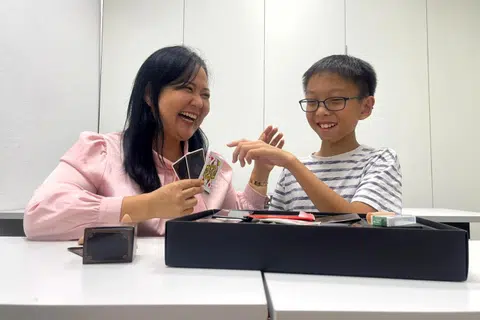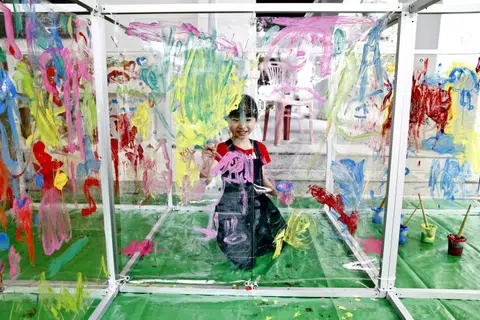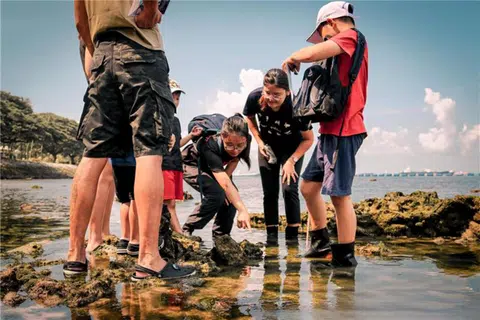September school break: Exam revision is important, but don't neglect playtime for academic success
Play boosts brain development and reduces anxiety. experts say.
The September school holidays are here and that means year-end and national examinations - from PSLE to A levels - are just around the corner.
While it is tempting for parents to encourage their tweens and teens to use their week-long break for studying, experts stress the importance of not over-scheduling their time with only revision. Play and relaxation are also vital for them to perform well.
There is growing research on the importance of play for children's brain development, physical and emotional health, and academic performance, says Associate Professor Sirene Lim, dean of the S R Nathan School of Human Development at the Singapore University of Social Sciences.
Prof Lim advises students to take short breaks and step away from their study areas between sessions. This can help prevent mental burnout, which often manifests as reduced attention and impaired memory.
Engaging in physical activities and play can alleviate anxiety, while also releasing happiness hormones like endorphins.
While it is easy to assume that tweens and teens are interested only in mobile devices, they actually desire creative and imaginative play, especially when it aligns with their interests.
Parents should actively support and create opportunities for them to engage in such play, says Ms Karen Chin, pedagogist at Playeum, a charity that champions children through play, creativity and the arts.
She reiterates the well-documented benefits of play, such as picking up valuable life skills. These include listening, negotiating, resolving conflicts and strengthening relationships.

Ms Laura Oh, who has more than a decade of experience tutoring primary- and secondary-school students, is an advocate for play. At her House of Hows education centre, she often incorporates fun into learning, such as engaging her students with magic tricks during lesson breaks.
She recently organised an outing to the TreeTop Walk and is planning a Squid Game-themed treasure hunt that her students asked for after their year-end exams.
"We design programmes around what excites children," she says. "Play isn't just fun. It makes learning stick and melts away stress in the process."
Playing with students helps her build stronger connections, which is a compelling reason for parents to also engage in play with their children.
"Once we step into their world, we can make them look forward to learning and bring out the best in them," she adds.
But as exams approach, what is the optimal balance between study and play?
"There is no magic ratio," says Prof Lim, a former secondary school and junior college teacher. She suggests a balanced schedule, following the World Health Organisation's and Singapore's guidelines for children aged under 18.
This involves at least 60 minutes of moderate-to-vigorous physical activity daily, such as playing sports, skating, skipping or other forms of exercise. They are also encouraged to engage in light physical activities throughout the day, such as walking a dog, running errands or helping with housework.

Some parents plan leisure activities with a learning purpose, such as visits to parks, hoping their children will learn science concepts.
Ms Debbie Chen, senior assistant director of education at Gardens by the Bay, advises against forcing curriculum concepts during such outings. "Let it be natural and organic, give your children the space to make their own observations, and see what interesting thoughts come from those," she suggests.
The former junior college teacher also emphasises the importance of pre- and post-visit conversations to maximise the experience.
"Before a visit, identify what excites your children and, afterwards, discuss what resonated with them and how those interests can be further explored," she adds.
What should we play today?
Play does not have to be time-consuming. It can take many forms and be free or inexpensive. Here are some ideas.
Free trials
Trial classes are a great way to see if an enrichment programme is a good fit for your kids. But the cost of some trials can sometimes hold you back.
Flying Cape, an online booking and advisory platform for enrichment programmes and learning activities, is offering SG60 Experience credits to Singaporeans and permanent residents with children aged 15 and below. This is in celebration of Singapore's 60th birthday and to support the National Families for Life movement.
The credits can be used to redeem a variety of experiences, including programmes in Stem (science, technology, engineering and mathematics), arts, music and sports.
Redemption is available until Dec 31 and requires Singpass authentication. Once redeemed, the credits are valid for one year. Go to www.flyingcape.com.sg/sg60 for the full list.
Here are three highlights for tweens and teens, available for booking this September school holidays and beyond.
Football: The Real Madrid Foundation Football School has one-hour sessions designed for children aged 10 to 15. The programme focuses on technical drills, tactical play and teamwork, while also fostering discipline, respect and resilience. There are five locations to choose from, including Toa Payoh, West Coast and Yishun. Find out more at str.sg/w82B3

Guitar: Music school Believer Music is offering a special guitar class for fathers and their children aged eight to 15 to learn the instrument together. Supported by the Dads for Life movement, this one-hour session teaches them guitar chords, strumming and simple songs. Classes are available at four outlets, including Anson and Novena. Find out more at str.sg/F5Qi
Coding: The Lab provides one-hour coding and robotics classes for children aged nine to 14 at four outlets, including Katong and Woodlands. Students will develop computational thinking and logical sequencing skills through the school's Blockly coding platform. They will then apply the concepts on a Raspberry Pi robot, coding it to move and respond to commands. Each participant will take home a coding board game worth $50 to continue their learning journey beyond the session. Find out more at str.sg/q47S
For nature lovers
Gardens by the Bay offers free nature and sustainability tours (str.sg/yeKF) every weekend, such as the sensory stroll series which encourages engagement with plants and their functions through guided observation and even taste.
For children who develop a deeper interest in nature, they can become citizen scientists and proactive observers, says Ms Chen from Gardens by the Bay. They can download the iNaturalist app and record observations of interesting flora and fauna, contributing valuable data to Gardens by the Bay's biodiversity records.
Connecting with nature can also be as simple as a walk close to home, she adds.
To enhance these experiences, your kids can take snapshots of plants, wildlife and landscapes. Nature photography can reinforce classroom learning by providing visual examples for topics such as biodiversity, life cycles in plants and animals, and the importance of pollinators.
Another engaging option is nature journaling, where children record their observations, thoughts and feelings about nature. This encourages self-expression and improves writing skills without the pressure of formal essays, says Ms Chen.

Your family can also explore Singapore's coastal backyards and discover marine animals. Enrichment provider Young Nautilus leads intertidal walks at sandy shores such as Coney Island and Pasir Ris. Alternatively, venture into the mangrove forests of Sungei Buloh Wetland Reserve with its educators.
These wildlife nature walks cost $56 for children under 12 and $58 for adults. Sign up via booking platform Flying Cape at str.sg/BMhn
For kids who prefer screens
Work in harmony with, rather than against, your children's interests, says the team at Playeum.
To spark creativity and fulfil their need for using devices, encourage tweens or teens to delve into activities such as filming, editing, music production or coding.
Suggest that they produce a short "how-to" video on a topic of interest, using their phone camera. For example, they can demonstrate how to free up mobile phone storage or poach an egg.
Family outings and friends' birthday parties also provide good chances for them to record and edit videos.
They can also compile a Spotify playlist for stress relief or produce an Instagram Reel or TikTok on a topic they care about, such as tips for destressing during revision time.
As Playeum's executive director Ms Charlotte Goh says: "The goal is creation over consumption."
More family bonding ideas
The Playeum team shares more leisure activities that parents can explore with their tweens and teens.
Food hunting: Food brings everyone together, connecting hearts and satisfying cravings. Check out new eating spots near your home together or, if you have more time, explore farther.
Cooking: When dining at home, encourage your children to explore their culinary skills. Choose a recipe they enjoy from social media, gather the ingredients together and then let them prepare the meal.
Working out: Why not try some home workout videos on YouTube together? Ms Goh from Playeum even gets in on the action with her 14-year-old son, tossing basketballs for him to practise shooting hoops.
"Not only is it active and playful, with a lot of laughter, but often he also hugs and thanks me for 'training' with him," she says.
Elisa Chia for The Straits Times